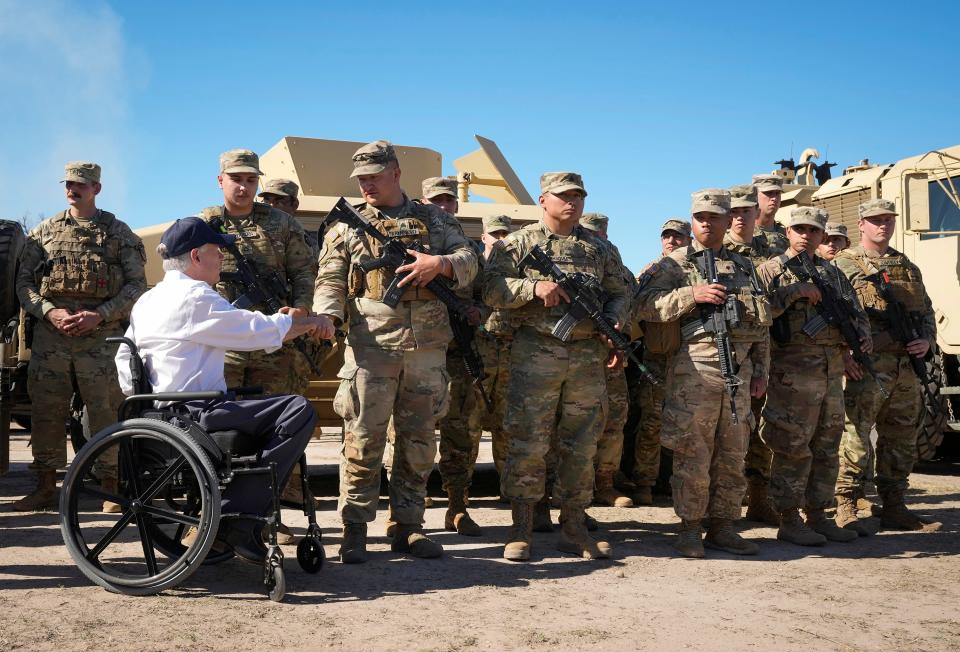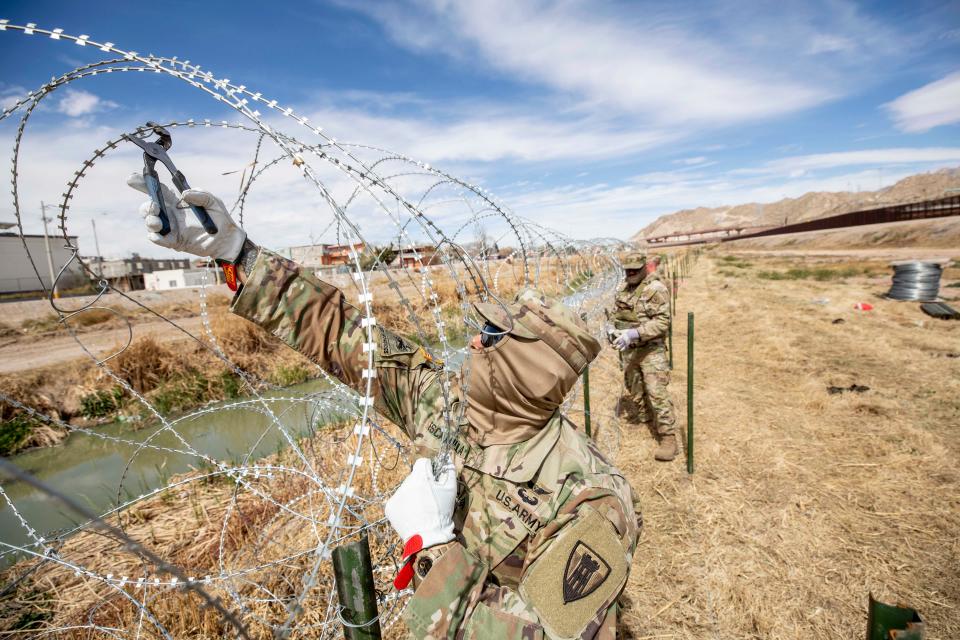Dan Patrick calls for a deep dive into the effects of serving in Operation Lone Star
A little-noticed, and therefore little-reported, item on Lt. Gov. Dan Patrick's topics for the Texas Senate to delve into before the 2025 legislative session is an examination of the effects that being deployed to Operation Lone Star has on members of the National Guard and troopers with the Department of Public Safety.
Patrick deserves credit for elevating this matter. But it's troubling that the marching orders to the Senate Border Security Committee to study "the effect on personnel who have actively served or participated in Operation Lone Star and the impact of their service on their health and well-being" comes 3? years after the mission's launch and that its announcement seemed to fall short of the center of the radar screen.
For the past generation or so, the act of sending military service members into action on the public's behalf generally has ignited waves of patriotism and bumper-sticker sloganeering. Then, after the waves crest, the waters tend to calm down. The troops, however, remain deployed.
And when they come home, especially with injuries seen and unseen, too often the "we support our troops" mantra from the outset morphs into something like "we can't afford the cost of caring for them."

Look no farther than the protracted effort to get government benefits for the thousands of veterans of the Iraq and Afghanistan wars made sick, often deathly sick, by round-the-clock exposure to giant toxic burn pits that incinerated military waste. According to the Department of Veterans Affairs' own calculations, nearly 8 of every 10 claims for burn pit-related disability benefits were denied between 2007 and 2020.
More: Greg Abbott takes his Texas-honed immigration message on the road with a visit to New York
Not until 2022, when Congress was essentially shamed into passing the historic PACT Act, did the country do right by the service members who sacrificed their health, and too often their lives, in service to the rest of us. It could be argued that if the death of President Joe Biden's son, Beau, had not been linked — at least anecdotally — to burn pit exposure, suffering veterans such as Texas' own Le Roy Torres would still be vainly patrolling the halls of the nation's Capitol to call attention to their cause.
The fact is, Beau Biden, as the son of a nationally known political figure, was an outlier when it comes to those who carry the modern burden of military service; Le Roy Torres, a DPS trooper in civilian life, was not. The ranks of the armed forces, which include the National Guard, are filled 100% by volunteers. According to a 2020 report by the Council on Foreign Relations, 62% of military recruits came from households on the middle and low rungs of the nation's income ladder. Only 17% came from the top rungs.
A look at the raw numbers offers a finer point. The United States population is about 336 million, according to the U.S. Census Bureau. But only about 2 million serve in the military. A smaller subset, 430,000 or so, serve in National Guard units in states around the nation.
And that brings us back to Operation Lone Star, which is largely staffed by guard troops. And given how small a slice of the population actually serves, the chances of anyone who is not serving being related to or actually knowing someone deployed to the Texas border are pretty slim.

For much of the public, the only interaction with the troops on the border is when they are arrayed wearing camouflage fatigues in the background of a news conference on TV often designed more to score political points than to offer a glimpse of the sacrifice of service.
Recall that early in the operation, there was a spate of news accounts of a half-dozen or more guard troops taking their own lives and reports that many weren't being paid and several were frustrated that the open-ended deployment upended their civilian careers, education and even their home lives.
But as headlines often do, many of these have faded. In late November, the Texas Military Department issued a terse statement that National Guard Spc. Andrew Fredrick Blakely had died on Thanksgiving Day near Laredo. Local police said it appeared the cause was a self-inflicted gunshot. The Military Department said it was investigating the matter.
Asked Friday about the status of the investigation, the department told the American-Statesman nothing would be released unless a formal open records request was filed. Now, one has been filed, but that doesn't mean any information will be forthcoming soon, or at all, if it's determined that the investigation and its findings are exempt from the Texas Public Information Act.
It's not yet known what direction the Border Security Committee will take to complete the charge Patrick laid down relating to the effect of serving in Operation Lone Star, which is now more than 4 years old and has cost Texas taxpayers north of $11 billion. Also unknown is whether the panel's examination will lead to legislation beneficial to those serving on the border.
But regardless of whether it does, legislative committee hearings can sometimes dig deeper than choreographed news conferences where guard troops in battle dress and DPS brass in their trademark white hats often look like props in a stage play. Here's hoping Patrick's assignment yields at least that.
This article originally appeared on Austin American-Statesman: Dan Patrick's call for closer look at Operation Lone Star is needed
Solve the daily Crossword

